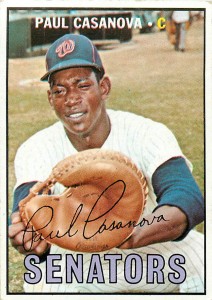Endurance is the most remarkable trait of professional athletes. Whether it’s Alex Ovechkin grinding through 13 NHL seasons before winning the Stanley Cup or Max Scherzer powering through eight innings to strike out 13 batters, remarkable displays of strength and stamina make for compelling competition.
On June 12, 1967, 41 years ago Tuesday, Senators catcher Paul Casanova showed such tenacity, working 22 innings behind the plate and driving in the winning run in a 6-5 victory over the Chicago White Sox.
That Casanova even made the major leagues was a tribute to his endurance and persistence. As a child in Cuba, he was so determined to play baseball that he made his own bat from a tree he cut down, fashioned a catcher’s mask out of wire and put together his own team using castoffs.
He got an offer from Cleveland in 1960 and played 10 games for Minot of the Class C Northern League, but he was released had to return to Cuba. After warming the bench for a Cuban pro team, he fled the country with a few other players after the season.
Back in the United States, he played in 1961 for the Indianapolis Clowns, a former Negro League team that had become a barnstorming club. The next year, he played just two games at for Class A San Antonio in the Cubs system and survived doing odd jobs, like shoveling snow and operating a steamroller. The Senators signed him in 1963 after a scout saw him playing semipro ball in Connecticut.
While he would never be known for consistent hitting, the 6-4, 190 pounder had a cannon arm, and by 1967, he blossomed into one of the best catchers in the game. He put out 827 runners trying to cross the plate that season and cut down 37 would-be base stealers, with a caught stealing rate of 49 percent. He was voted by his peers to the American League All-Star team but did not play in a 15-inning, 2-1 loss.
Coming into what would be an historic June 12 contest at D.C. Stadium, the White Sox were atop the AL at 31-20, while the Senators were last at 24-32. Senators starter Joe Coleman was immediately touched for a run, but Washington struck back in the fourth, when Frank Howard and Cap Peterson hit back-to-back homers. In the sixth, Peterson hit a two-run shot, knocking out starter Joe Horlen. But the Sox scored three times in the seventh off Coleman, and the game was tied at 4 after nine.
In the tenth, Chicago took the lead on Don Buford’s RBI single, but the Senators tied it on a sac fly by pinch hitter Jim King, after Ken McMullen had his only hit of the game, then advanced to third on two wild pitches.
As the night turned into early morning, Casanova’s defense extended the game. In the 13th, Tommy Agee, on third with one out, broke for home on Tom McCraw’s grounder to short, but Bob Saverine threw home, and Casanova applied the tag. In the 16th, with the pitcher at bat, Ken Berry tried to steal home, but Casanova handled Dave Baldwin’s pitch and tagged Berry out.
Casanova’s arm was the difference in the next inning. Walt Williams tried to sacrifice Jerry McNertney to second, but Casanova fielded the ball and threw to Saverine for the force. Willliams then tried to steal second, but Casanova’s peg to Saverine cut him down as well.
In the bottom of the 20th, with one out, Chicago intentionally walked powerful Mike Epstein to load the bases for Casanova, who grounded into a 5-2-3 double play. Two innings later, they again put Epstein on to load the bases. This time, however, Casanova lined the ball to left, scoring Bernie Allen to win it for Washington.
Casanova was the hero of the longest major league night game to that date, at 22 innings and six hours, 38 minutes. He worked another 20 innings on Aug. 9, 1967, when the Senators became the first team ever to play two games of at least 20 innings. Casanova was 4-for-9, including a single in a game-tying, seven-run, seventh-inning rally in the 9-7 win at Minnesota.
Casanova’ defense remained stellar throughout his career, but he never came close to his .248 average of 1967. In 1971, after the Senators moved to Texas, he was traded to Atlanta, where he was mostly a reserve and became good friends with home run king Henry Aaron and future Nationals manager Dusty Baker. He also caught knuckleballer Phil Niekro’s no-hitter against San Diego on Aug 5, 1973.
An elbow injury ended Casanova’s career after the 1974 season. In retirement, he operated a baseball academy out of his Miami home with numerous proteges in the major leagues, including Red Sox slugger JD Martinez. His home also included a shrine to Cuban baseball stars.
Casanova died at 75 on Aug. 12, 2017 from cardio-respiratory complications. He was warmly remembered afterward by his former teammate Baker and will live forever in the hearts of his teammates and fans.






